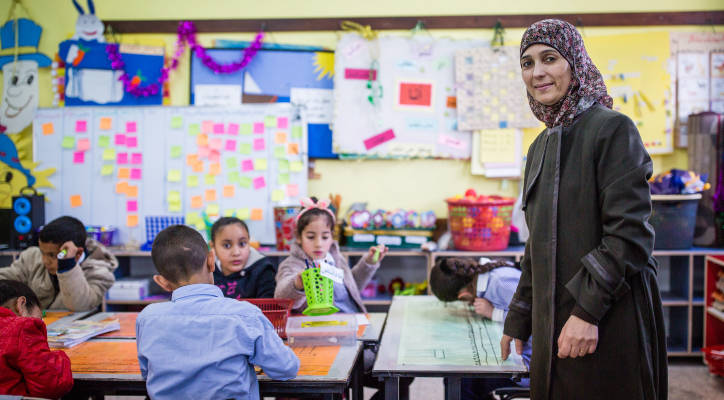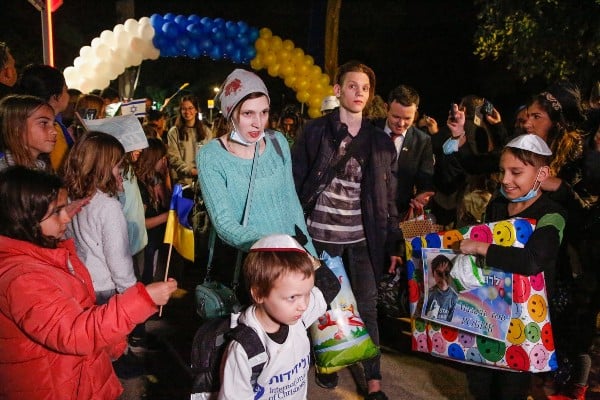The international community must insist on a democratic and moderate curriculum introduced into local Palestinian schools that will negate terrorism and promote peace.
By Chaim Lax, Honest Reporting
One of the key questions occupying politicians, academics, media personalities, and concerned laypeople is what will happen to Gaza the day after the Israel-Hamas war is over, and the terrorist organization is routed from leadership of the coastal enclave.
Along with concerns about who will administer the Gaza Strip, how its infrastructure will be rebuilt, and how a sense of security will return to Israel’s border communities, there is also the question of how Palestinian society in Gaza will be de-radicalized after 18 years of Hamas control.
The key to that question is education reform.
To those who claim that the effect of Israel’s war against Hamas on the average Palestinian civilian — coupled with decades of anti-Israel and anti-Jewish education — is a surefire recipe for continued radicalism in the Gaza Strip, there is a historical precedent for education reform helping to de-radicalize and moderate societies that were headed by political movements just as fanatical as Hamas.
Following the end of World War II, both Germany* and Japan underwent a process of de-radicalization that worked to upend the militaristic political and social infrastructure that guided their aggressive expansionism, ultimately leading to world war.
Under the initial influence of the Allied forces and later under the initiative of local civil servants, both Germany and Japan reformed their education systems by emphasizing the value of democracy, removing ultra-nationalism and militarism from the school curricula, giving a greater role to local authorities instead of the central government, and updating the teacher accreditation system.
It should be noted that these reforms occurred after the destruction and displacement wrought by the Allies in their fight against Nazi Germany and Imperial Japan.
Despite the resentment that the German and Japanese peoples might have felt against the Allies for their conduct during the war, this did not produce a more radical society than existed prior to the defeat of each major Axis power.
While the German and Japanese societies did not change overnight, the education reforms implemented in the immediate aftermath of World War II helped pave the way for each country to become the strong democracies and robust economies that they are today.
Even in the past few years, we have seen how education reform is part and parcel of peace processes and de-radicalization.
Following the signing of the Abraham Accords with Israel in 2020, the United Arab Emirates has undertaken a process of moderating its educational texts, removing harmful passages about both Jews and Israel.
While there are some negative depictions of Israel still available in certain texts, the moderation process has been deemed “overwhelmingly positive.”
This moderation of the UAE’s school curriculum has also included the recent introduction of Holocaust studies for both primary and secondary school students.
In Bahrain (another Abraham Accord signee), there have been steps toward moderating that country’s educational curriculum about Israel, but grassroots opposition from local religious figures has called into question how far these reforms will go.
Even Saudi Arabia — a regional powerhouse that has slowly opened up to Israel even though the two countries do not share official relations — has undertaken an incremental moderation of its educational texts concerning Israel and the Jewish people.
While negative depictions of Israel still exist in these texts, this moderation process is a promising first step.
After Hamas no longer controls Gaza, the local education system must undergo a comprehensive reform to undo the damage wrought by 18 years of Hamas leadership.
However, it is just as important to know who will be conducting this reform.
Both the Ramallah-based Palestinian Authority and UNRWA, the main UN body operating in Palestinian areas, have been mentioned as being prime actors in the rehabilitation of Gaza following the war.
However, these two bodies are already part of the problem: UNRWA runs several schools in Gaza, while Hamas uses the core PA curriculum in its local schools.
According to the education monitoring organization IMPACT-se, textbooks used in both PA and UNRWA schools extol terrorism, advocate for the destruction of Israel, and perpetuate antisemitic stereotypes.
If the international community wishes for a bright future for a post-Hamas Gaza, it must insist on a democratic and moderate curriculum introduced into local Palestinian schools that will negate terrorism and promote peaceful relations with neighboring Israel.
If teaching materials akin to those offered by the PA and UNRWA are used to replace those used by Hamas, this is not a recipe for a brighter Gazan future. Instead, it is a formula for another October 7.
* While the initial education reforms in post-war Germany were similar under the guiding hand of the Western Allies and the Soviet Union, there ultimately were differences between how the education systems were reformed in West Germany and East Germany.
Bring Purim Joy to Israeli Victims of War and Terror
Join us in providing Israeli victims of war and terror with much needed comfort, blessing and holiday joy.
Families have been destroyed by the horrific Hamas massacre of October 7th and ongoing terror and rockets attacks. There are so many orphans that need our love, compassion and support!
Brighten their Purim holiday by sending Purim food baskets, yummy treats, personal notes and toys for the children.
CLICK HERE TO SEND YOUR PURIM GIFT & PERSONAL NOTE TO THE VICTIMS



